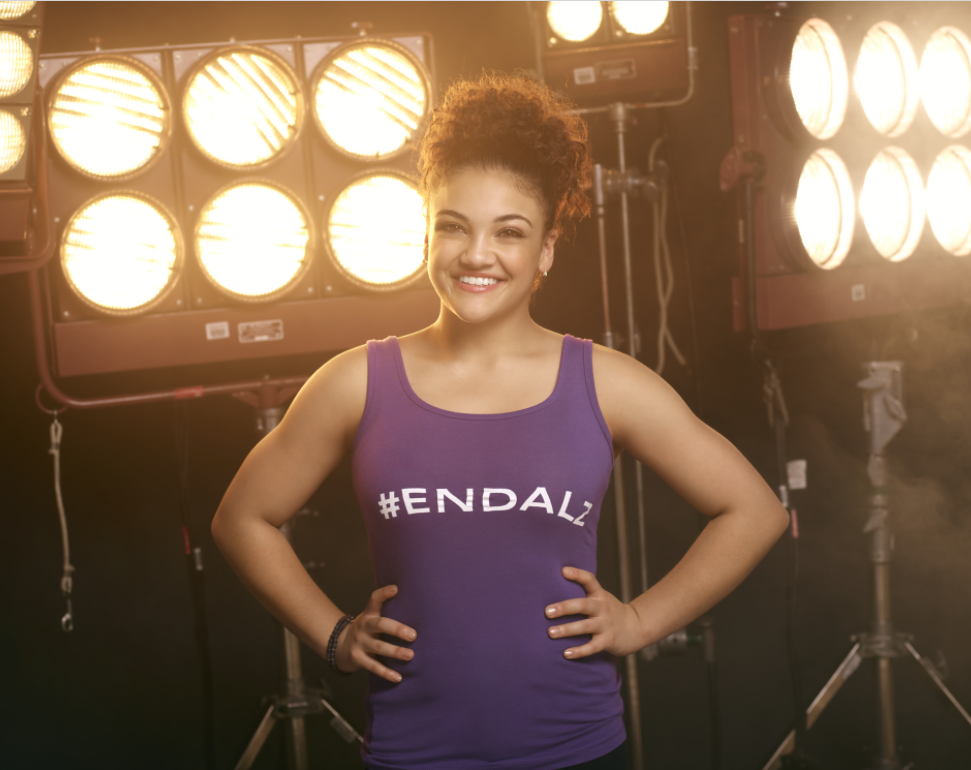American gymnast, Olympian gold medalist, and Dancing with the Stars champion, Laurie Hernandez knows a thing or two about performing under pressure, but for her, family comes first, which is why she’s championing a cause close to her heart, Alzheimer’s disease. Hernandez lost her grandmother to Alzheimer’s so she knows first hand about how difficult it is to be a caregiver for someone who has this progressive disease. 
Hernandez, joins other celebrity champions, such as Selenis Leyva and Alfred Molina, to help raise awareness during Alzheimer’s and Brain Awareness Month by sharing their personal stories with the Alzheimer’s Association and are helping raise awareness on social media by posting photos of themselves wearing purple using the #EndAlz and #MyAlzStory hashtags.
“My family really came together when it was [time] to take care of my grandmother,” says Hernandez in a My Story video for the Alzheimer’s Association. She comes from a very tight-knit family and was very close with her grandmother. “Seeing how much Alzheimer’s affected my dad and seeing how he reacted towards his mom having it…it was really hard for us as well.”
Being a caregiver for someone with dementia or Alzheimer’s Disease is extremely difficult. The Alzheimer’s Association recently released a survey that shows the impact that this disease has on families, especially when they’re caregivers and this is what they found:
*Far too many caregivers are doing it alone. The survey found two out of three caregivers (64%) felt isolated or alone in their situation, and more than four in five caregivers (84%) would have liked more support with caregiving tasks, particularly from their family.
* The No. 1 reason people said they did not help with providing care for someone with Alzheimer’s or another form of dementia was they felt as though another family member had already taken on the responsibility (74%), followed by their not living in the same area (62%).
*Alzheimer’s is one of the costliest diseases affecting seniors. People greatly fear to become a burden to their families as they age, but they are not planning accordingly. For example, 70% of people fear being unable to care for themselves or to support themselves financially, but only 24% have planned financially for their families in preparation for any future caregiving needs. Moreover, 74% of people said they would prefer a paid caregiver, but only 15% have financially planned for one.
*Alzheimer’s stress can bring families closer or tear them apart. Relationships between siblings were found to be the most strained, stemming from not having enough support in providing care (61%) as well as the overall burden of caregiving (53%). Among all caregivers who experienced strain in their relationships, many felt like their efforts were undervalued by their family (43%) or the person with the disease (41%).
Fortunately, caregivers can turn to the Alzheimer’s Association for help. Alzheimer’s disease is a progressive disease, which means that dementia symptoms gradually worsen over a number of years.
“Alz Connected is an online platform that allows the caregivers, people with the disease, family members to connect with others and talk about the strategies they are using on a day to day basis to provide good care to the person with related dementia,” explains Moreno. “They can talk about some of the challenges that they’re experiencing, what has helped other caregivers to help reduce the stress that they’re experiencing.” This is a great resource for those caregivers who feel helpless, have questions, or just want to speak to someone who has experienced the same thing they are going through, which can be very beneficial.
The Alzheimer’s Association is a great resource for caregivers, for more information visit Alz.org.
